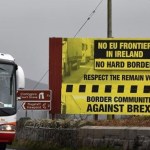Brexit—the seemingly unsolvable problem the UK got itself into when an ill-fated vote on June 23, 2016 determined its departure from the European Union. Following extension after extension of the deadline for the UK to make its official exit, there’s still no agreed plan for how the two bodies will handle the split.
But don’t worry everybody, there’s a simple solution here—one so obvious you probably didn’t even notice it sitting in the thousands of headlines populating business and tech blogs over the past several years. It’s blockchain, silly.
Or so Pindar Wong, chairman of VeriFi (Hong Kong) wrote in Coindesk today in a column titled, “Is It Time for a Blockchain Brexit?” (Wong is also a member of Coindesk’s advisory board). Since so many of Brexit’s problems stem from “bordered thinking,” he writes, can’t blockchain, a technology that promises to render borders obsolete with easy, cross-border transactions, come to the rescue? The borders created by blockchain governance have to do with time, not geography, argues Wong, since they’re time-stamped and exist in purely digital space. It’s a perfect workaround for a geo-political problem.
We can forget geography entirely? Why didn’t anyone say so earlier?
“That is why today I’m calling for the UK and EU governments to participate in a bottom-up process to establish a ‘Brexit Blockchain’: where customs authorities use a blockchain architecture to take the friction out of tariff enforcement by agreeing on the provenance of economic activity on a temporal, not geographic, basis,” Wong writes.
We can forget geography entirely? Why didn’t anyone say so earlier? Without geography as a factor, Brexit will be so much easier. There will be no need to remember, for instance, the Irish border that separates the Republic of Ireland, part of the EU, from Northern Ireland, part of the UK. We can also forget the bloody battles that came with that border, largely played out during The Troubles, a decades-long conflict between those who wanted Northern Ireland to remain with the UK versus those who wanted it to join with the rest of Ireland.
Who needs history? The only “border” that should matter now, in the internet age, is time. And thanks to blockchain, we can make that happen. What a tidy idea.
I won’t pretend to be well informed about the historical conflicts surrounding the Irish border—but that’s also why I’m not proposing a one-note solution for how to deal with it in the wake of the UK’s Brexit decision. Ignoring not just the historical context but the present-day logistics of this border (about 30,000 people cross the Irish border daily) is not just frankly insensitive, but also indicative of a wider problem with the tech world prescribing digital solutions to physical, human, and historically rich problems. These “solutions” lack context in favor of efficiency, rendering them ethically impractical and, at times, dangerous.
Get the BREAKERMAG newsletter, a weekly roundup of blockchain business and culture.
Look no further than everyone’s favorite example(s) of irresponsible tech—Facebook and the 2016 election, or Facebook and the human moderators of traumatic content, or Facebook and the arbitration of white supremacist content. Facebook and large tech companies like it cause problems because the people making important decisions at those companies are focused on progress and profit margins, creating innovative tech without deeply considering the ethical dilemmas inherent in those creations.
[The article] is indicative of a wider problem with the tech world prescribing digital solutions to physical, human, and historically rich problems.
Tech cannot be divorced from the people it seeks to serve if it’s going to serve them at all. Maybe blockchain can be integrated into some kind of Brexit fix. To be fair, Wong does make a couple solid points in his piece. The Brexit withdrawal agreement, a whopping 584 pages, does not include the word “internet” (or “web”) once, which is a little absurd for the most digitally connected time in Earth’s history. It’s definitely fair to suggest that online dealings factor into political decisions. Wong also notes that the chance of Britain and the EU seeing governance the way he’s laying it out is “a pipe dream.”
Okay, fair enough—Wong’s piece is a thought experiment. Let’s lay off. But for all the people who are genuinely working on human-focused, socially conscious projects using blockchain, let’s do them—and the people who can benefit from their work—a favor. Let’s not flippantly throw blockchain at problems as a magic solution, lest people start equating the tech with, say, a large-scale social network.
